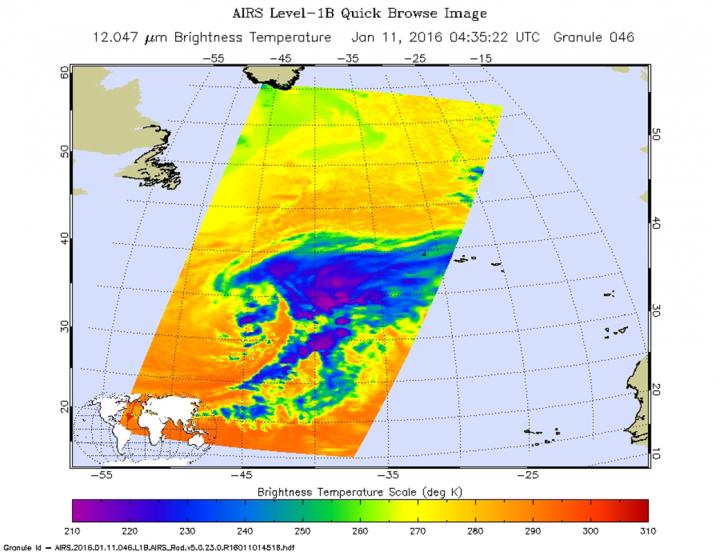NASA eyeing an interesting weather system in northern Atlantic

On Jan. 11 at 0435 UTC, the AIRS instrument aboard NASA's Aqua satellite saw coldest cloud top temperatures near -63F/-53C and strongest storms east of the center in this out-of-season extra-tropical low pressure area. Credits: NASA JPL, Ed Olsen
NOAA's National Hurricane Center (NHC) noted the development of the extra-tropical low pressure area on Sunday, January 10 at 1:50 p.m. EST. The system was about 900 miles east of Bermuda and is producing a large area of gale-force winds and maximum winds of hurricane force.
On Jan. 11 at 0435 UTC (Jan. 10 at 11:35 p.m. EST) the Atmospheric Infrared Sounder aboard NASA's Aqua satellite captured infrared data on the system. AIRS provides valuable temperature data such as cloud top and sea surface temperatures. AIRS showed strongest storms with coldest cloud top temperatures near minus 63 degrees Fahrenheit (minus 53 degrees Celsius) east of the center of circulation.
By 1200 UTC (7 a.m. EST) the National Weather Service (NWS) High Seas Forecast (HSF) stated that there is an Atlantic Gale Warning in the area of the low pressure system. At that time, the low pressure area was centered just north of 31.5 degrees north latitude and 44 degrees west longitude, about 900 miles southwest of the Azores.
Minimum central pressure was near 985 millibars. The NWS HSF said that cold front associated with the system extends from 31 degrees north latitude and 39 west longitude to 25 degrees north latitude and 40 west longitude to 19 degrees north and 50 degrees west to 19 degrees north and 57 degrees west.
The clouds along that front are visible in the AIRS infrared image and look like a long tail that extends from the east of the low to the south of the low pressure center.
The National Hurricane Center (NHC) noted at 1400 UTC (2 p.m. EST) that the non-tropical low was producing a large area of gale-force winds with maximum winds near 60 mph. Shower activity was limited near the center, but NHC noted that the low could gradually acquire some subtropical or tropical characteristics during the next couple of days while it moves southeastward and then eastward into the eastern subtropical Atlantic. NHC said over the next 5 days this system has a 40 percent chance of becoming a depression.
NHC said “regardless of subtropical or tropical cyclone formation, this system is expected to produce hazardous marine conditions over portions of the central and eastern Atlantic for the next few days.”
###
For additional information, see at http://www.
Media Contact
All latest news from the category: Earth Sciences
Earth Sciences (also referred to as Geosciences), which deals with basic issues surrounding our planet, plays a vital role in the area of energy and raw materials supply.
Earth Sciences comprises subjects such as geology, geography, geological informatics, paleontology, mineralogy, petrography, crystallography, geophysics, geodesy, glaciology, cartography, photogrammetry, meteorology and seismology, early-warning systems, earthquake research and polar research.
Newest articles

Superradiant atoms could push the boundaries of how precisely time can be measured
Superradiant atoms can help us measure time more precisely than ever. In a new study, researchers from the University of Copenhagen present a new method for measuring the time interval,…

Ion thermoelectric conversion devices for near room temperature
The electrode sheet of the thermoelectric device consists of ionic hydrogel, which is sandwiched between the electrodes to form, and the Prussian blue on the electrode undergoes a redox reaction…

Zap Energy achieves 37-million-degree temperatures in a compact device
New publication reports record electron temperatures for a small-scale, sheared-flow-stabilized Z-pinch fusion device. In the nine decades since humans first produced fusion reactions, only a few fusion technologies have demonstrated…





















